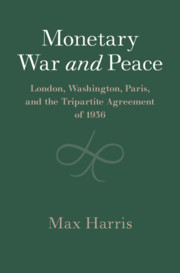Book contents
- Monetary War and Peace
- Studies in Macroeconomic History
- Monetary War and Peace
- Copyright page
- Contents
- Figures
- Tables
- Acknowledgments
- Abbreviations
- Introduction
- 1 A Classical Prelude, 1880–1914
- 2 Britain’s Biggest Blunder, 1914–1931
- 3 Hostilities Commence, 1931–1933
- 4 Washington Declares War, 1933–1935
- 5 Negotiating Peace, 1935–1936
- 6 A New Order, 1936–1939
- 7 Gold and Dollars, 1936–1937
- 8 Keeping France Afloat, 1937–1938
- 9 Battle for Sterling, 1938–1939
- 10 From Bretton Woods to Today
- Conclusion
- Book part
- References
- Index
- Series page
8 - Keeping France Afloat, 1937–1938
Published online by Cambridge University Press: 24 February 2021
- Monetary War and Peace
- Studies in Macroeconomic History
- Monetary War and Peace
- Copyright page
- Contents
- Figures
- Tables
- Acknowledgments
- Abbreviations
- Introduction
- 1 A Classical Prelude, 1880–1914
- 2 Britain’s Biggest Blunder, 1914–1931
- 3 Hostilities Commence, 1931–1933
- 4 Washington Declares War, 1933–1935
- 5 Negotiating Peace, 1935–1936
- 6 A New Order, 1936–1939
- 7 Gold and Dollars, 1936–1937
- 8 Keeping France Afloat, 1937–1938
- 9 Battle for Sterling, 1938–1939
- 10 From Bretton Woods to Today
- Conclusion
- Book part
- References
- Index
- Series page
Summary
This chapter examines the problems of the franc during the Tripartite years. The Big Three generally shared the following hierarchy of priorities (in decreasing order of importance): maintain solidarity, uphold the Tripartite Agreement, forestall exchange control, and prevent excessive depreciation. They succeeded in achieving their top three priorities, a signal accomplishment. Yet confidence in the franc plummeted at times, and with French requests for financial support refused and capital fleeing at an unsustainable rate, depreciation seemed the only way out. The ensuing falls in the franc were larger than Britain or America wished, but both agreed that it was much better to manage them within the club than to eject France. It was far more important for the general framework of the Agreement to survive than to risk all that had been gained over too strict an interpretation of its guidelines.
Keywords
- Type
- Chapter
- Information
- Monetary War and PeaceLondon, Washington, Paris, and the Tripartite Agreement of 1936, pp. 187 - 208Publisher: Cambridge University PressPrint publication year: 2021

